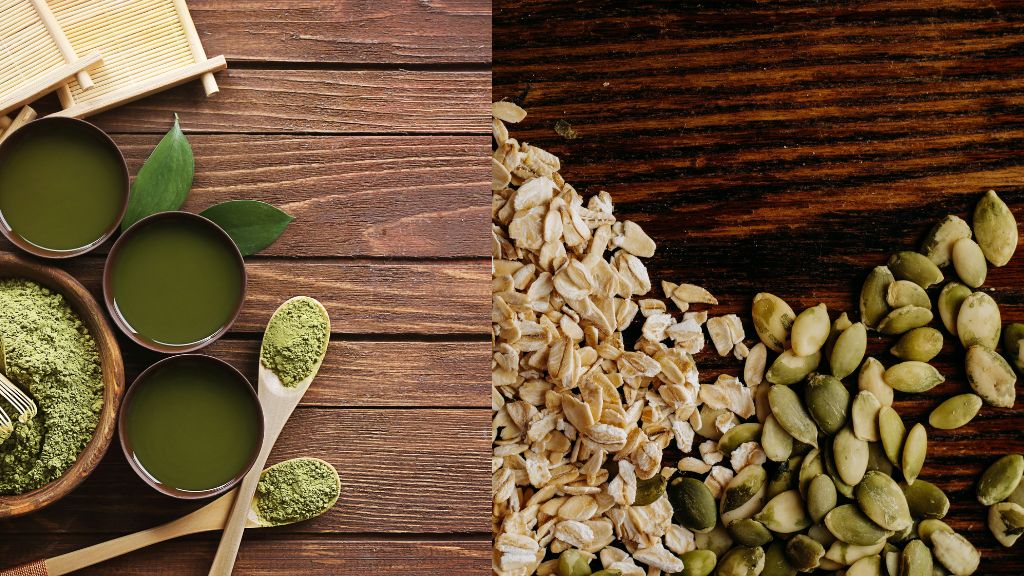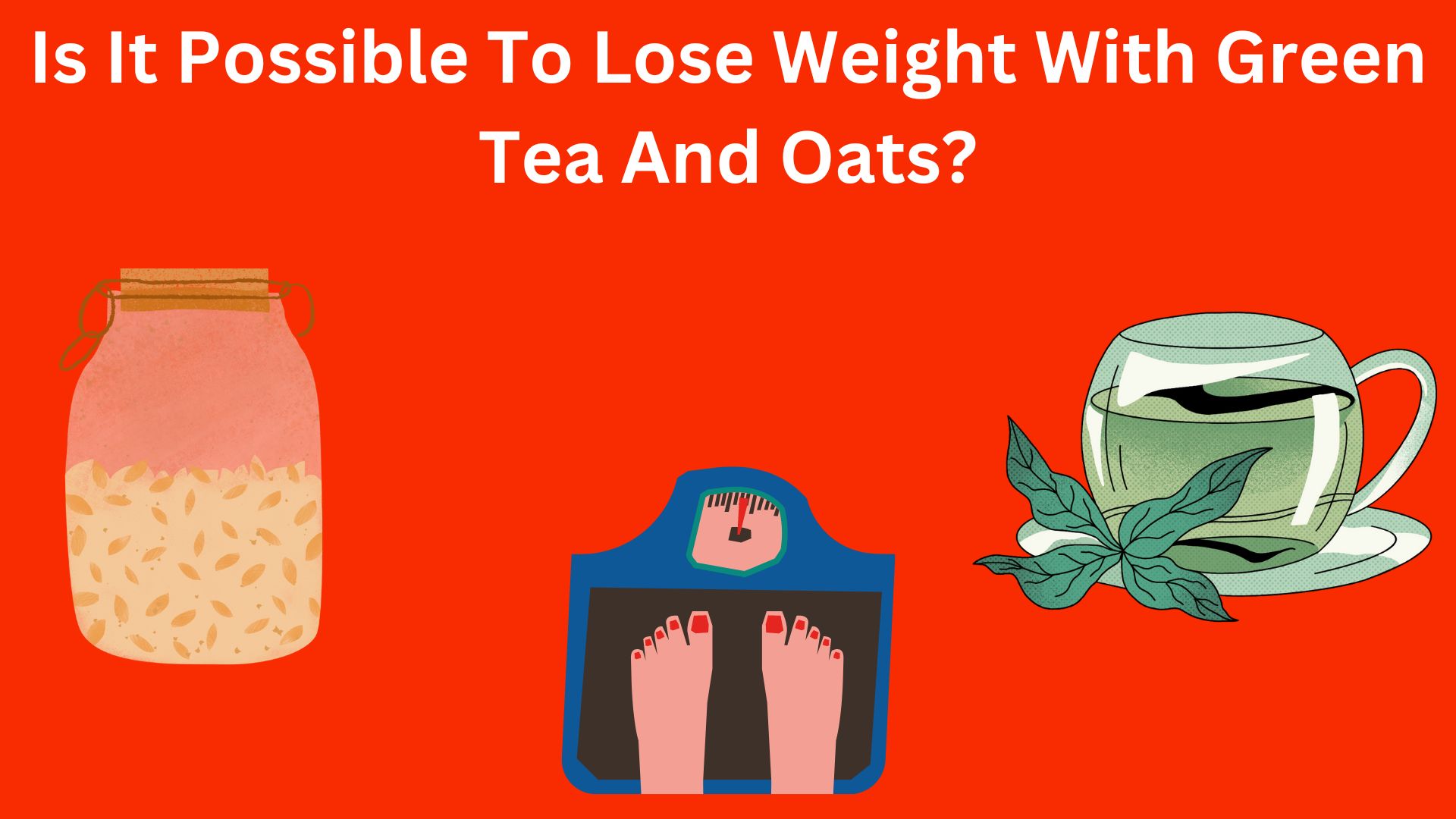Welcome to our article on losing weight with green tea and oats!
Losing weight can be a difficult and often frustrating process, but including certain beverages and foods in your diet may aid in your efforts. Green tea and oats are two such foods that have been demonstrated to have potential weight-loss advantages.
It’s a popular fallacy that particular meals and beverages, such as oats or green tea, may miraculously help you lose weight. This, however, is just not the case. While oats and green tea offer certain health benefits and can be part of a well-rounded diet, they are not a miracle weight loss cure. To lose weight, you must establish a calorie deficit by eating fewer calories and increasing your physical activity. This can be accomplished by a combination of food and exercise, but results take constant work and lifestyle modifications. It’s critical to remember that no single food or drink has the ability to significantly affect your weight on its own.
What Are Green Tea And Oats?
Green tea is a popular beverage high in antioxidants that have been linked to a variety of health benefits. According to some studies, green tea may assist enhance metabolism and aid in weight loss by enhancing energy consumption and fat oxidation.
Oatmeal is a whole grain that is high in fiber and protein, which may help you feel full and content. They are also low in calories and include a variety of nutrients that may aid in weight loss, such as antioxidants and beta-glucan, a form of soluble fiber that may aid in cholesterol reduction and blood sugar regulation.
In this blog, we’ll look at the potential weight reduction benefits of green tea and oats, as well as how to include them in your diet for the best results. We’ll also provide you with some pointers and considerations if you want to lose weight with green tea and oats.
We hope that this blog will provide you with useful information and motivation as you work toward your weight-loss objectives.
Weight Loss Benefits Of Green Tea And Oats
Weight Loss Benefits Of Green Tea
1. Green tea may help increase energy expenditure and fat oxidation, which can lead to weight loss.
Green tea may aid in increasing energy expenditure, which is the amount of energy used by the body to perform its many processes. When the body expends more energy, it increases metabolism, which can lead to weight reduction.
Green tea’s thermogenic impact is one way it may help raise energy expenditure. Thermogenesis is the process through which the body produces heat, which requires energy. According to some studies, green tea may induce thermogenesis, resulting in an increase in energy expenditure and perhaps encouraging weight loss.
Green tea may also aid in fat oxidation, which is the process through which the body breaks down fat deposits for energy usage. According to some research, the catechins present in green tea may help accelerate fat oxidation, resulting in a reduction in body fat and possibly boosting weight loss. More research, however, is required to completely understand the effects of green tea on fat oxidation and weight loss.
2. Green tea contains catechins, which are antioxidants that may help reduce body weight and body fat.
Catechins are a type of flavonoid antioxidant found in green tea. Green tea contains significant levels of catechins, which have been linked to a number of potential health advantages.
One possible advantage of catechins is their ability to lower body weight and fat. According to some research, catechins may help suppress the enzyme responsible for fat breakdown, resulting in less fat accumulation and possibly boosting weight loss. Furthermore, catechins may aid in fat oxidation, which is the process through which the body breaks down fat deposits for energy. This can also help with weight loss.
However, the evidence on catechins’ weight reduction effects is inconsistent, and additional research is needed to properly understand their involvement in weight loss. It’s also worth mentioning that the weight-loss effects of catechins may be moderate and dependent on other factors like diet and physical exercise.
3. Green tea has been shown to improve insulin sensitivity, which can help regulate blood sugar levels and reduce the risk of developing type 2 diabetes.
Insulin is a hormone that helps to regulate blood sugar levels. Insulin resistance can result in elevated blood sugar levels and an increased risk of developing type 2 diabetes. Green tea may help enhance insulin sensitivity, which means the body is better equipped to use insulin to regulate blood sugar levels, according to some research. This can also help with weight loss because good insulin sensitivity is essential for maintaining a healthy weight.
Green tea may help enhance insulin sensitivity through a variety of routes. Green tea, for example, may aid in the reduction of inflammation, which has been associated with insulin resistance. Furthermore, the catechins present in green tea may enhance insulin sensitivity by increasing glucose uptake by cells and decreasing glucose synthesis by the liver.
More research is required to completely understand the impact of green tea on blood sugar control and type 2 diabetes. Furthermore, while green tea may have some blood sugar control benefits, it is important to remember that it is not a replacement for other lifestyle choices such as a good diet and regular exercise, which are also crucial for maintaining blood sugar regulation and preventing type 2 diabetes.
4. Green tea may help reduce appetite and food intake, leading to a reduction in calorie intake and potentially promoting weight loss.
Green tea may help lower hunger and food intake, which might lead to calorie reduction and possibly improve weight loss.
Green tea may help reduce appetite by boosting the synthesis of hunger and fullness hormones such as cholecystokinin (CCK) and glucagon-like peptide-1 (GLP-1). These hormones aid in food intake regulation by signaling to the brain when we are full and satisfied. According to some research, the catechins present in green tea may help boost the synthesis of these hormones, resulting in a decrease in hunger and food consumption.
Furthermore, green tea may aid in weight loss by improving feelings of fullness and pleasure after eating. According to some research, the catechins present in green tea may help inhibit fat absorption in the intestine, resulting in a greater feeling of fullness after eating. However, the evidence on green tea’s appetite-reducing effects is inconsistent, and additional research is needed to properly understand its function in weight loss. It’s also worth mentioning that the weight loss effects of green tea may be minor and dependent on other factors like diet and physical activity.
5. Green tea has been shown to improve cardiovascular health, which can be beneficial for weight loss as physical activity is an important component of a weight loss program.
Green tea has been demonstrated to promote cardiovascular health, which can help with weight loss because physical activity is a key part of any weight loss program. Cardiovascular disease refers to disorders affecting the heart and blood vessels, including coronary artery disease, heart failure, and stroke. High blood pressure, high cholesterol, and other risk factors, such as food and physical activity, are frequently the root causes of these diseases.
According to some studies, green tea may assist improve cardiovascular health by lowering blood pressure and cholesterol levels. Green tea catechins may help limit cholesterol absorption in the intestine, resulting in lower cholesterol levels. Furthermore, green tea may enhance blood vessel function, lowering the chance of developing cardiovascular disease.
More research is required to completely understand the impact of green tea on cardiovascular health. Furthermore, while green tea may have some cardiovascular health benefits, it is crucial to note that it is not a replacement for other lifestyle variables such as a good diet and regular physical activity, all of which are necessary for maintaining cardiovascular health.
Weight Loss Benefits Of Oats
1. Oats are high in fiber, which can help promote feelings of fullness and reduce appetite.
Oats are high in dietary fiber, a form of carbohydrate that the body cannot digest. Dietary fiber is classified into two types: soluble and insoluble. Oats contain both forms of fiber, the most abundant of which is soluble fiber.
When soluble fiber comes into touch with water, it forms a gel-like substance in the stomach, which can help boost feelings of fullness and lower hunger. This can assist to slow the emptying of the stomach, resulting in a greater sense of fullness and a decreased appetite.
Furthermore, soluble fiber can help manage blood sugar levels by decreasing glucose absorption into the bloodstream. This can help to avoid blood sugar spikes and falls, which can lead to sensations of hunger and cravings.
Overall, the high fiber content of oats can aid in weight loss by increasing feelings of fullness and decreasing appetite, resulting in a reduction in calorie intake. It’s important to note that the effects of fiber on weight loss may be minimal and may depend on other factors such as diet and physical activity.
2. Oats have a low glycemic index, which means they can help regulate blood sugar levels and reduce the risk of developing type 2 diabetes.
The glycemic index (GI) of a food indicates how quickly it elevates blood sugar levels. Foods with a high GI induce a quick rise in blood sugar, whereas foods with a low GI promote a slower, more steady rise.
Because oats have a low glycemic index, they can help manage blood sugar levels and lower the likelihood of developing type 2 diabetes. Controlling blood sugar levels can help minimize the chance of developing health issues such as stroke, and nerve damage.
Oats have a low glycemic index because they are abundant in fiber, which can aid decrease glucose absorption into the system. Furthermore, oats contain beta-glucan, a form of soluble fiber that has been demonstrated to reduce blood sugar levels.
It’s important to note that oats’ glycemic index might vary based on how they’re processed and cooked. Steel-cut oats, for example, which are less processed and require more time to cook, have a lower glycemic index compared to rolled oats, which are more processed and require less time to cook. On average, whole oats have a lower glycemic index than processed oats.
Overall, oats’ low glycemic index can help with weight loss by regulating blood sugar levels and lowering the chance of developing type 2 diabetes. It’s also worth noting that the weight loss effects of oats may be moderated and may be influenced by other factors such as diet and physical activity.
3. Oats are rich in nutrients and are a good source of vitamins and minerals, which can help support a healthy diet and weight loss.
Oats are a whole grain that is high in nutrients such as vitamins and minerals. They are high in various essential nutrients, including:
- Fiber: Oats are packed with fiber, which can help you feel full and content after you eat. Fiber can assist in lowering hunger and cravings for unhealthy snacks, which can be especially beneficial for weight loss.
- Protein: Oats include a lot of protein, which can help the body grow and repair tissues. Protein can also help you feel full and satisfied, which can make it easier to stick to a balanced diet.
- Vitamins and minerals: Oats include a variety of vitamins and minerals, including vitamin B1 (thiamin), vitamin B2 (riboflavin), and iron. These nutrients are essential for overall health and can help to promote a healthy diet.
Overall, oats are a healthy meal that can be included in a balanced diet. They can be a rich source of fiber, protein, and essential vitamins and minerals, all of which can aid with health and weight loss.
4. Oats help improves cholesterol levels, which can be beneficial for weight loss as high cholesterol is a risk factor for heart disease and other health problems.
Oats include beta-glucan, a form of soluble fiber that has been demonstrated to help decrease cholesterol levels. When beta-glucan is taken, it creates a gel-like substance in the digestive tract that aids in the binding of cholesterol in the body and the removal of cholesterol from the body via the stool. This can assist to lower overall cholesterol levels in the blood, which can aid with weight loss and overall health.
High cholesterol puts you at risk for heart disease and other health issues including stroke and type 2 diabetes. Oats can assist to lessen the risk of several health problems and boost weight loss attempts by lowering cholesterol levels.
It is crucial to note that oats, when ingested as part of a healthy diet, can assist to improve cholesterol levels. They should not, however, be used as the sole method of decreasing cholesterol. Other lifestyle habits, such as regularly exercising and a nutritious diet, can also aid in cholesterol reduction and weight loss.
5. Oats can be included in a variety of meals and snacks, making them a convenient and tasty addition to a weight-loss diet. They can be eaten as a hot breakfast cereal, added to smoothies, or used as a topping for yogurt or oatmeal bowls.
Oatmeal is a flexible item that may be easily incorporated into a wide range of meals and snacks. As a result, they are a practical and delightful supplement to any weight-loss plan.
Some ways to incorporate oats into your diet are as follows:
Hot breakfast cereal: To create hot breakfast cereal, cook oats with water or milk. To make them more palatable, they might be seasoned with cinnamon, honey, or other sweets.
Smoothies: Oats can be added to smoothies to increase fiber and protein. They can also help thicken and fill up the smoothie.
Oatmeal or yogurt bowls: Oatmeal or yogurt bowls can be topped with oats. They can be combined with nuts, fruit, and other toppings to make a filling and healthy snack or breakfast.
Overall, oats are a convenient and tasty method to supplement your diet and aid in your weight loss goals. They may be easily included in a wide range of meals and snacks, making them an important food to keep on hand as part of a healthy diet.
Ways To Incorporate Green Tea And Oats Into Diet

Ways To Incorporate Green Tea Into The Diet
1. Drink it as a beverage:
Drinking green tea as a beverage is one of the simplest ways to incorporate it into your diet. To make green tea more appealing, it can be served hot or iced and flavored with honey, lemon, or other natural sweeteners.
2. Add it to smoothies:
Green tea can be included in smoothies to enhance antioxidants and other healthy ingredients. It can be combined with fruit, vegetables, and other ingredients to make a tasty and nutritious smoothie.
3. Use as a marinade:
Green tea can be marinated with meat and vegetables. Tea can aid to tenderize and flavoring food while also giving some health advantages.
4. Make ice cubes:
To enhance flavor and nutrition, freeze green tea into ice cubes and add them to water or other beverages. This is an easy and quick method to include green tea in your diet.
5. Use it in baking:
Green tea can be used in baking to enhance the flavor and nutritional value of baked goods. It can be used to offer a new twist to standard recipes for bread, cookies, and other delights.
Ways To Incorporate Oats Into Diet
1. Eat them as a hot breakfast cereal:
One of the simplest and most traditional ways to include oats in your diet is as a hot morning cereal. To make oats more appetizing, simmer them with water or milk and flavor them with honey, cinnamon, or other sweets.
2. Add them to smoothies:
Oats can be included in smoothies to add fiber and protein. They can also help thicken and fill up the smoothie.
3. Use them as a topping for yogurt or oatmeal bowls:
To make a pleasant and healthy topping for yogurt or oatmeal bowls, combine oats with nuts, fruit, and other ingredients.
4. Incorporate them into baked goods:
Oatmeal can be used to add taste and nutrients to bread, cookies, and other baked goods. They can also be used to top granola bars and other snack products.
5. Use them as a coating for meats and vegetables:
Oatmeal can be pounded into fine flour and used to cover meats and vegetables. This can add flavor and nutrition to foods while also assisting in the creation of a crispy texture.
Tips And Considerations For Losing Weight With Green Tea And Oats
Tips And Considerations For Losing Weight With Green Tea
1. Choose high-quality green tea:
When attempting to reduce weight with this beverage, it is critical to select high-quality green tea. Look for products that employ full tea leaves rather than tea dust or fannings, as these contain more beneficial components.
2. Don’t on green tea alone:
While green tea can be a beneficial supplement to a weight loss diet, it should not be used as the main source of weight loss. A well-rounded strategy for weight loss should involve a nutritious diet, regular physical activity, and other lifestyle adjustments.
3. Don’t overdo it:
Green tea can be drunk in moderation as part of a balanced diet, but it should not be consumed in excess. Excessive green tea drinking might result in unpleasant side effects such as stomach trouble, headaches, and insomnia.
4. Pay attention to added ingredients:
When drinking sweetened or flavored green tea, it’s critical to pay attention to the added ingredients. Some sweeteners and flavors can add calories and sugar to the drink, negating some of the tea’s potential weight-loss benefits.
5. Consider timing:
According to certain studies, the timing of green tea drinking can influence its weight loss benefits. Some studies have suggested that drinking green tea before or during meals may be more helpful than drinking it afterward for aiding weight loss. It’s important to think about when you drink green tea to determine whether it affects your weight loss attempts.
Tips And Considerations For Losing Weight With Oats
1. Choose whole oats:
When attempting to lose weight with oats, it is critical to select whole oats rather than processed oats. Steel-cut or rolled oats are less processed and have a lower glycemic index, which can help to stabilize blood sugar levels and minimize cravings for unhealthy foods.
2. Don’t rely on oats alone:
While oats can be a beneficial supplement to a weight-reduction diet, they should not be used as the main source of weight loss. A well-rounded strategy for weight loss should involve a nutritious diet, regular physical activity, and other lifestyle adjustments.
3. Watch portion sizes:
When introducing oats into your diet, it’s crucial to keep portion amounts in mind. Oats are high in calories and, if ingested in excess, can contribute to weight gain. Consider using a measuring cup or scale to determine the appropriate serving size to help control portion sizes.
4. Be mindful of added ingredients:
Oats can be flavored and sweetened in a variety of ways, including with honey, fruit, and nuts. While they might enhance the flavor and nutritional value of oats, they can also add calories and sugar. It is critical to be aware of the extra ingredients and to select products that are lower in calories and added sugars.
5. Consider timing:
According to several studies, the timing of oat eating can influence its weight loss benefits. According to some research, eating oats before or during meals may be more beneficial for weight loss than eating them afterward. It’s worth thinking about when you eat your oats to see whether it affects your weight loss attempts.
Frequently Asked Questions About Losing Weight With Green Tea And Oats
Yes, it is plausible that drinking green tea and eating oats can help you lose weight. Green tea contains catechins, which have been found to boost metabolism and fat oxidation, potentially resulting in weight loss. Oats include fiber, which can help you feel full and satisfied, perhaps leading to lower calorie intake and weight loss. However, it is crucial to realize that weight loss is a complex process that is influenced by a variety of circumstances. Adopting a healthy, balanced diet and being physically active is essential for achieving and maintaining weight loss.
It is generally recommended to drink 2-3 cups of green tea every day for its potential weight loss advantages. It is crucial to note, however, that the weight loss effects of green tea may be minor and may vary between individuals.
As part of a healthy, balanced diet, it is generally recommended to consume 1-2 servings of oats per day. A serving of oats is commonly defined as 12 cups of dry oats or approximately 1 cup of cooked oats. It’s crucial to remember that the weight loss effects of oats can be moderate and vary between people.
It is also crucial to highlight that weight loss is not exclusively dependent on the consumption of specific foods or beverages, and that it is necessary to follow a good, balanced diet and be physically active in order to accomplish and sustain weight loss. Consult a healthcare expert for tailored weight loss diet and physical activity suggestions.
As part of a healthy, balanced diet for weight loss, green tea and oats can be consumed alone or in conjunction with other foods. However, it is crucial to realize that weight loss is a complex process that is influenced by a variety of circumstances. Adopting a healthy, balanced diet and being physically active is essential for achieving and maintaining weight loss.
Green tea can be drunk as a beverage on its own or in combination with other foods and beverages. Green tea, for example, can be blended with lemon and honey to make a tasty and refreshing drink, or it can be drunk with meals as a substitute for sugary drinks.
Oatmeal can be eaten alone or in conjunction with other foods. They can be boiled and consumed as hot cereal, or they can be used to add nutrition and flavor to smoothies, baked goods, and other foods. Oats can also be included in oatmeal bars and other snack items.
While green tea and oats may have significant weight loss benefits, they should be consumed as components of a healthy, balanced diet and not as a replacement for other essential nutrients. Consult a healthcare professional for personalized weight loss diet and physical activity recommendations.
It’s generally recommended to consume green tea and oats as part of a healthy, balanced diet for weight loss, rather than as a replacement for meals. While green tea and oats may have potential weight loss benefits, they should not be relied upon as the sole source of nutrition.
Consuming a healthy, balanced diet that includes a variety of nutrient-dense foods can help support weight loss and overall health. This may include foods from all food groups, including fruits, vegetables, whole grains, lean proteins, and healthy fats.
It’s important to pay attention to portion sizes and calorie intake when trying to lose weight. Consuming too many calories, even from healthy foods, can prevent weight loss. It’s generally recommended to aim for a calorie deficit, which means consuming fewer calories than your body needs, to lose weight. Consult with a healthcare professional for personalized recommendations on calorie intake for weight loss.
In addition to a healthy diet, it’s important to be physically active to achieve and maintain weight loss. Consult with a healthcare professional for personalized recommendations on diet and physical activity for weight loss.
When ingested in moderation as part of a healthy, balanced diet, green tea and oats are generally regarded as safe and well-tolerated. However, there are a few possible unfavorable side effects of drinking green tea and oats.
Some people may experience digestive troubles with oats, such as bloating, gas, and diarrhea. This is because oats contain beta-glucan fiber, which can be difficult for some people to digest. To allow the body to acclimate, it’s best to start with a little number of oats and gradually increase the amount taken.
Green tea use in significant amounts may induce digestive disorders such as stomach distress, nausea, and constipation. Green tea also includes caffeine, which in some people can produce jitters, anxiety, and insomnia. Green tea should not be consumed in excess of four cups per day.
Oats may cause digestive issues in some people, such as bloating, gas, and diarrhea. This is because oats contain a type of fiber called beta-glucan, which can be difficult for some people to digest. It’s generally recommended to start with a small number of oats and gradually increase the amount consumed to allow the body to adjust.
It’s crucial to remember that everyone is unique and will react differently to green tea and oats. If you have any bad side effects after eating these meals, it is critical that you consult with a healthcare practitioner. It’s also worth noting that losing weight is a complicated process with numerous elements at play. Adopting a healthy, balanced diet and being physically active is essential for achieving and maintaining weight loss. Consult a healthcare expert for tailored weight loss diet and physical activity suggestions. To achieve and maintain weight loss, it’s important to adopt a healthy, balanced diet and be physically active. Consult with a healthcare professional for personalized recommendations on diet and physical activity for weight loss.
Conclusion
To summarize, combining green tea and oats as part of a healthy, balanced diet may aid in weight loss. Green tea includes catechins, which have been found to boost metabolism and fat oxidation, potentially leading to weight loss. Oats include fiber, which can help you feel full and satisfied, perhaps leading to lower calorie intake and weight loss. It is crucial to remember, however, that the weight loss effects of green tea and oats may be small and may vary between individuals
Adopting a healthy, balanced diet and being physically active is essential for achieving and maintaining weight loss. As part of a balanced diet, it is recommended to eat 2-3 cups of green tea per day and 1-2 servings of oats per day. Individual needs, however, may differ depending on characteristics such as age, gender, weight, height, and activity level. Consult a healthcare expert for tailored weight loss diet and physical activity suggestions.
While green tea and oats are typically regarded as safe and well-tolerated in moderation, it is crucial to be aware of the potential negative side effects, such as digestive difficulties and caffeine-related symptoms. It is critical to report any unwanted side effects after taking these foods.




[…] coffee and green tea, as you may be aware, have gained popularity in recent years as natural weight loss aids. They are […]
[…] to our blog about weight loss and the debate over whether green tea or apple cider vinegar is better for accomplishing this aim. […]